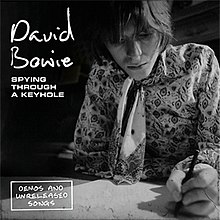
During his lifetime, English singer-songwriter David Bowie (1947–2016) released 26 studio albums, nine live albums, two soundtrack albums, 26 compilation albums, eight extended plays, 128 singles and six box sets. Since his death, one further studio album, 13 live albums, one soundtrack album, one compilation album, four extended plays and six box sets have been released. Bowie also released 28 video albums and 72 music videos. Throughout his lifetime, Bowie sold at least 100 million records worldwide. In 2012, Bowie was ranked ninth best selling singles artist in United Kingdom with 10.6 million singles sold. As of January 2016, 12.09 million Bowie singles had been sold in Britain. In a period of 24 months since his death, five million records were sold in UK, 3.1 million singles and two million albums.

Hunky Dory is the fourth studio album by the English musician David Bowie, released in the United Kingdom on 17 December 1971 through RCA Records. Following a break from touring and recording, Bowie settled down to write new songs, composing on piano rather than guitar as in earlier works. Bowie assembled guitarist Mick Ronson, bassist Trevor Bolder, and drummer Mick Woodmansey, and began to record a new album in mid-1971 at Trident Studios in London. Rick Wakeman contributed on piano shortly before joining Yes. Bowie co-produced the album with Ken Scott, who had engineered Bowie's previous two records.
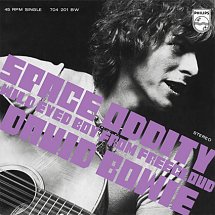
"Space Oddity" is a song by the English singer-songwriter David Bowie. It was first released on 11 July 1969 by Philips Records as a 7-inch single, then as the opening track of his second studio album, David Bowie. Produced by Gus Dudgeon and recorded at Trident Studios in London, it is a tale about a fictional astronaut named Major Tom; its title and subject matter were partly inspired by 2001: A Space Odyssey (1968) and Bowie's feelings of alienation at that point in his career. One of the most musically complex songs he had written up to that point, it represented a change from the music hall-influenced sound of his debut to a sound akin to psychedelic folk and inspired by the Bee Gees.

David Bowie is the second studio album by the English musician David Bowie, originally released in the United Kingdom on 14 November 1969 through Mercury affiliate Philips Records. Financed by Mercury on the strength of "Space Oddity", the album was recorded from June to October 1969 at Trident Studios in London. Gus Dudgeon produced "Space Oddity", while Tony Visconti produced the rest of the album. It featured an array of collaborators, including Herbie Flowers, Rick Wakeman, Terry Cox and the band Junior's Eyes.

"Life on Mars?" is a song by the English singer-songwriter David Bowie, first released on his 1971 album Hunky Dory. Bowie wrote the song as a parody of Frank Sinatra's "My Way". "Life on Mars?" was recorded on 6 August 1971 at Trident Studios in London, and was co-produced by Bowie and Ken Scott. Bowie's backing band consisted of guitarist and string arranger Mick Ronson, bassist Trevor Bolder, drummer Mick Woodmansey and Strawbs member Rick Wakeman on piano. "Life on Mars?" is primarily a glam rock ballad, with elements of cabaret and art rock; it has a complex structure that includes chord changes throughout. The lyrics are about a girl who goes to a cinema to escape reality, and include surreal images that reflect optimism and the effects of Hollywood.

The Man Who Sold the World is the third studio album by the English musician David Bowie, originally released through Mercury Records in the United States on 4 November 1970 and in the United Kingdom on 10 April 1971. Produced by Tony Visconti and recorded in London from April to May 1970, the album features the first appearances on a Bowie record of future Spiders from Mars members Mick Ronson and Mick Woodmansey.
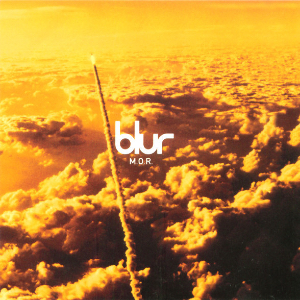
"M.O.R." is a song by English rock band Blur from their eponymous album. Released on 15 September 1997, "M.O.R." reached number 15 in the UK Singles Chart on its release as a single in September 1997. Worldwide, it reached number 45 in New Zealand and also charted in Australia, Canada, and the United States.
"The Man Who Sold the World" is a song by the English singer-songwriter David Bowie. The title track of Bowie's third studio album, it was released in November 1970 in the US and in April 1971 in the UK by Mercury Records. Produced by Tony Visconti, it was recorded at Trident and Advision Studios in London in May 1970, towards the end of the album's sessions; Bowie recorded his vocal on the final day of mixing for the album, reflecting his generally dismissive attitude during the sessions. Musically, it is based around a "circular" guitar riff from Mick Ronson. Its lyrics are cryptic and evocative, being inspired by numerous poems including the 1899 "Antigonish" by William Hughes Mearns. Bowie's vocals are heavily "phased" throughout and have been described as "haunting".
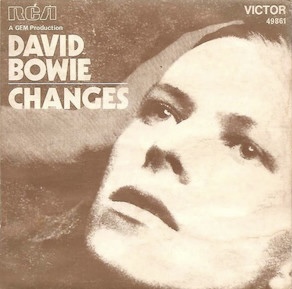
"Changes" is a song by the English singer-songwriter David Bowie from his 1971 album Hunky Dory. RCA Records then released it as a single from the album on 7 January 1972. Written following his promotional tour of America in early 1971, "Changes" was recorded at Trident Studios in London between June and July that year. Co-produced by Bowie and Ken Scott, it featured Rick Wakeman on piano and the musicians who would later become known as the Spiders from Mars—Mick Ronson, Trevor Bolder and Mick Woodmansey.
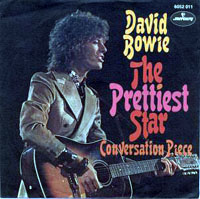
"The Prettiest Star" is a song by the English musician David Bowie, originally released on 6 March 1970 through Mercury Records as the follow-up single to "Space Oddity". A love song for his soon-to-be wife Angie, it was recorded in January 1970 at Trident Studios in London and featured Marc Bolan on guitar, who was brought on by producer Tony Visconti. Despite praise from music journalists, the single flopped and failed to chart. Years later, Bowie rerecorded the track for his 1973 album Aladdin Sane. A more glam rock influenced take with lyrics matching themes on the album, Mick Ronson recreated Bolan's guitar part almost note-for-note. The remake was more well-received.

"Cat People (Putting Out Fire)" is a song recorded by the English singer-songwriter David Bowie as the title track of the 1982 erotic horror film Cat People. Bowie became involved with the track after director Paul Schrader reached out to him about collaborating. The song was recorded at Mountain Studios in Montreux, Switzerland in July 1981. Bowie wrote the lyrics, which reflected the film, while the Italian producer Giorgio Moroder composed the music, which is built around only two chord changes.

"Never Let Me Down" is a song recorded by the English singer David Bowie, serving as the title track for his 1987 studio album of the same name. It was released as the third and final single from the record in 1987, and served as his last solo single until 1992's "Real Cool World". "Never Let Me Down" was written by the singer himself and Carlos Alomar, while production was handled by Bowie along with David Richards.

"Hallo Spaceboy" is a song by the English musician David Bowie from his 20th studio album, Outside (1995). It originated as an instrumental by Reeves Gabrels called "Moondust", which Bowie and Brian Eno stripped down and used to form the final track. An industrial rock and electronica number influenced by the Pixies and Nine Inch Nails, the song contains a hypnotic sound, with synthesisers, loops and distorted guitar lines. Lyrically influenced by Brion Gysin, the song contains images of apocalypse and continues the androgynous conundrums of former Bowie songs such as "Rebel Rebel".
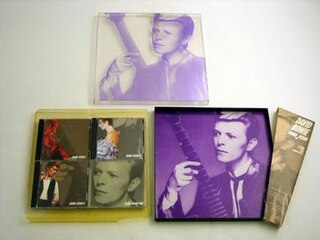
Sound + Vision is the first box set by English musician David Bowie, released by Rykodisc in 1989. By the end of the 1980s, the rights to Bowie's pre-1983 catalogue reverted to Bowie and his former management company, MainMan. Rykodisc had approached Bowie in 1988 to re-release his albums on CD and Bowie agreed, and in September 1989 the Sound + Vision box set was released. By April 1990, the box set had sold over 200,000 copies, which, for a set costing $50–$60, was considered "phenomenal".

Nothing Has Changed is a compilation album by English musician David Bowie. It was released on 18 November 2014 through Parlophone in the United Kingdom, and Columbia Records and Legacy Recordings in the United States. The album was released in four formats: a triple CD version, a double CD version, a double LP version, and a single CD version released exclusive to select countries.

Five Years (1969–1973) is a box set by English singer-songwriter David Bowie, released in September 2015. The period of Bowie's career from 1969 to 1973 is summarised over twelve discs and thirteen LPs. Exclusive to the box sets is Re:Call 1, a new compilation of non-album singles, single versions and B-sides. The collection is the first in a series of box sets covering Bowie's entire career.
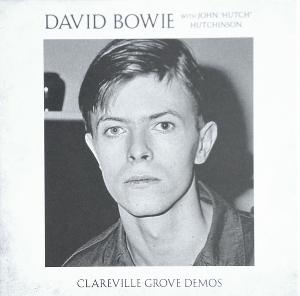
Clareville Grove Demos is a box set EP by English musician David Bowie, released posthumously in May 2019. The set includes three 7" vinyl records containing six songs performed by Bowie with his friend John Hutchinson in early 1969. All songs in the collection are presented in mono, demo form. In November, all songs were released on CD on the Conversation Piece box set.

The 'Mercury' Demos is a box set by English musician David Bowie, released as a vinyl album in May 2019. It features ten songs in mono, demo form performed by Bowie with his friend John Hutchinson in early 1969. In November 2019, the compilation was released on CD as part of the Conversation Piece box set.
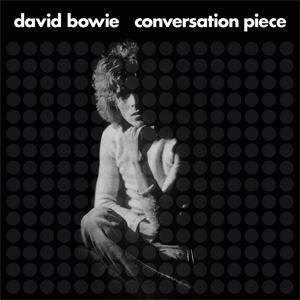
Conversation Piece is a box set by English musician David Bowie, released in November 2019, which contains five CDs featuring recordings made in 1968–1969. The box set includes home demos and BBC sessions, as well as two mixes of the 1969 album Space Oddity: the original 1969 stereo mix, and a new 2019 mix produced by Tony Visconti specifically for the set. The release of the 1969 mix is a repressing of the 2009 remastered CD, which was chosen due to its being mastered to match the original LP release, a priority that was not taken for Parlophone's in-house remaster created for the Five Years (1969–1973) box set in 2015.
